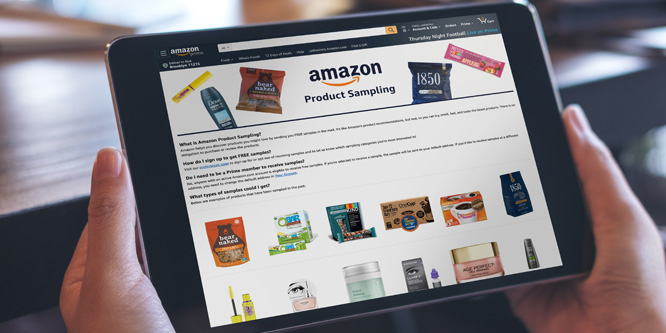
Source: amazon.com/samples
Amazon decides it has sampled enough
Amazon.com is shutting down a program offering free product samples to consumers as a paid advertising service for CPG brands. The program drew controversy because the sample choices were based on Amazon’s data on individual customers.
Under the program that was launched at the start of the year, advertisers paid $2 per sample, on top of the actual cost of each product, to send shoppers free products included with their orders.
According to the program’s landing page, the samples were “like Amazon’s product recommendations, but real.” Participating brands included Folgers, Maybelline, Dunkin’, Kind and Quaker. The program was available to both Prime and non-Prime members.
The initiative was seen as one way to differentiate Amazon’s digital advertising business by combining a package of physical products, retail data and logistics that the Google-Facebook advertising duopoly couldn’t match.
Amazon didn’t specify the reason for ending the program.
“Amazon is constantly testing and launching new offerings to innovate on behalf of customers,” an Amazon spokesperson told CNBC. “At this time, we have decided to discontinue the sampling program in 2020.”
The cancellation comes as tech giants, including Amazon, Facebook, Google and Apple, are under pressure from antitrust investigations over the use of consumers’ private information. Amazon has met with increasing scrutiny amid revelations that Ring, its surveillance doorbell division, plans to share surveillance video with police agencies, building on concerns over the company’s Rekognition facial recognition software.
Still, the sample program may not have been paying off for advertisers or Amazon may have struggled with execution issues.
A past job listing described the “Targeted Sampling” program as such: “Free samples of new products are sent to customers selected using ML (machine learning), thus ensuring a higher likelihood of conversion than display ads. The program has a challenging mix of problems involving targeting, fulfillment, customer and vendor experience, and cross-campaign learning.”
The program required advertisers to buy a minimum of 25,000 samples, equivalent to $50,000. Advertisers concerns may have included Amazon choosing to prioritize its own private label brands ahead of third-party CPGs, limited access to customer information and a prohibition against remarketing to those receiving samples.
- Amazon Product Sampling – Amazon
- Amazon is shutting down a controversial advertising program that lets brands slip samples into delivery boxes – Business Insider
- Amazon kills program that sent shoppers free items based on prior purchases – CNBC
- Amazon ends creepy program that sent samples based on purchase history – Engadget
- Will Amazon succeed with brand sampling rooted in machine learning? – RetailWire
Discussion Questions
DISCUSSION QUESTIONS: Do you see sending free samples based on browsing and purchase history being more problematic than sending consumers personalized recommendations? Do you think privacy issues killed Amazon’s sample program, or do you suspect it was execution issues or a lack of sufficient value for advertisers?


Effective programs don’t get shut down, so something here didn’t work as expected. While conceptually the program sounds compelling, it’s not hard to imagine all the ways that having samples picked by algorithms could go wrong. Beyond program execution issues, I believe that CPG companies’ concern about Amazon pushing their own private brands is a legitimate concern. Overall, I suspect the program was cancelled primarily due to execution issues and lack of advertiser interest – privacy issues were likely not the key reason, but an emerging potential problem.
I don’t think privacy concerns led to the demise of the free sample program. Other than the (admittedly important) “opt in” part of the program, this was really not that different from so many other sample programs that so many people subscribe to. I just don’t see many consumers feeling like their data was used improperly if they got free stuff that aligned to their preferences and tastes. So if shoppers weren’t complaining then this was an execution problem, not a data privacy problem. Amazon never backs down from a fight, and if the program was effective I have to believe they would have tried to fight through any regulatory concerns.
Clearly advertisers were not getting value from their investment – especially since they were prohibited from remarketing! One may tweak a successful marketing program — but will never stop it.
Amazon isn’t likely to have caved to concerns about privacy. The most likely explanation is the most obvious: the program didn’t deliver as planned. Amazon is good at fast-fail testing, so add this to the pile and move on.
Very likely the program is not effective any more in terms of uplift in sales for the advertisers, or more insights about shopper behavior for Amazon.
Waste. Time. Resources. Hard on the environment. Likely these are not the reasons. ML gone awry? Amazon a slippery slope for brands? Lack of results? Next!
Just to add my 2 cents here… Although my makeup brand is sold in multiple places, I buy it from one department store. You want to know why? They send free samples in the package. The twist? They don’t guess at what I want, they ask me! They have my business for LIFE!
People are interested in samples that they want, not ones which an AI has chosen for them. It would be much easier and more effective to simply offer people who have been pre-chosen, a choice of their samples, in exchange for simple feedback. This program clearly did not include pre-recognized demand by the consumer. If I get free samples of makeup, as a man, I have no need or desire for this sample…thus one of the issues of the program.